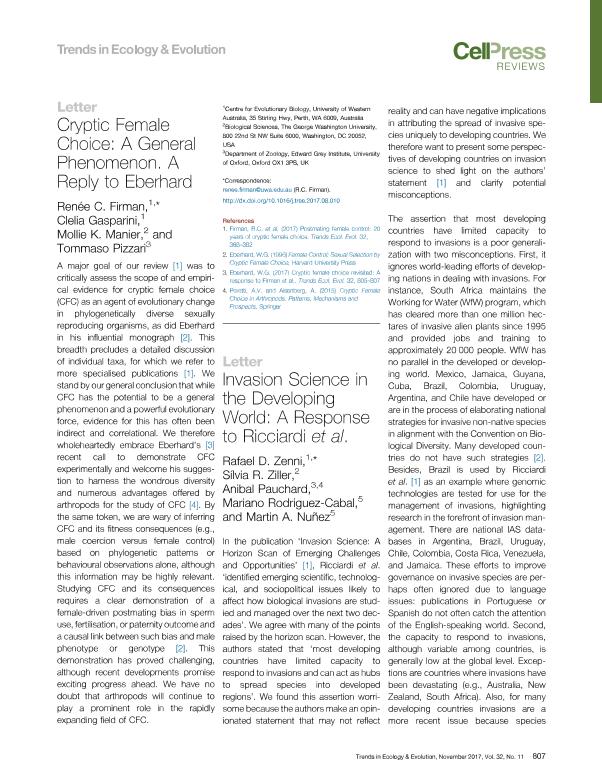Mostrar el registro sencillo del ítem
dc.contributor.author
Zenni, Rafael D.
dc.contributor.author
Ziller, Sílvia R.
dc.contributor.author
Pauchard, Anibal
dc.contributor.author
Rodriguez Cabal, Mariano Alberto

dc.contributor.author
Nuñez, Martin Andres

dc.date.available
2018-11-16T20:12:26Z
dc.date.issued
2017-11-01
dc.identifier.citation
Zenni, Rafael D.; Ziller, Sílvia R.; Pauchard, Anibal; Rodriguez Cabal, Mariano Alberto; Nuñez, Martin Andres; Invasion Science in the Developing World: A Response to Ricciardi et al.; Cell Press; Trends In Ecology And Evolution - Tree; 32; 11; 1-11-2017; 807-808
dc.identifier.issn
0169-5347
dc.identifier.uri
http://hdl.handle.net/11336/64659
dc.description.abstract
In the publication ‘Invasion Science: A Horizon Scan of Emerging Challenges and Opportunities’ [ 1], Ricciardi et al. ‘identified emerging scientific, technological, and sociopolitical issues likely to affect how biological invasions are studied and managed over the next two decades’. We agree with many of the points raised by the horizon scan. However, the authors stated that ‘most developing countries have limited capacity to respond to invasions and can act as hubs to spread species into developed regions’. We found this assertion worrisome because the authors make an opinionated statement that may not reflect reality and can have negative implications in attributing the spread of invasive species uniquely to developing countries. We therefore want to present some perspectives of developing countries on invasion science to shed light on the authors’ statement [ 1] and clarify potential misconceptions.
dc.format
application/pdf
dc.language.iso
eng
dc.publisher
Cell Press

dc.rights
info:eu-repo/semantics/openAccess
dc.rights.uri
https://creativecommons.org/licenses/by-nc-nd/2.5/ar/
dc.subject
Biological Invasions
dc.subject
Global Trade
dc.subject
Invasive Species
dc.subject
Management
dc.subject.classification
Otras Ciencias Biológicas

dc.subject.classification
Ciencias Biológicas

dc.subject.classification
CIENCIAS NATURALES Y EXACTAS

dc.title
Invasion Science in the Developing World: A Response to Ricciardi et al.
dc.type
info:eu-repo/semantics/article
dc.type
info:ar-repo/semantics/artículo
dc.type
info:eu-repo/semantics/publishedVersion
dc.date.updated
2018-10-23T16:18:48Z
dc.journal.volume
32
dc.journal.number
11
dc.journal.pagination
807-808
dc.journal.pais
Reino Unido

dc.description.fil
Fil: Zenni, Rafael D.. Universidade Federal de Lavras; Brasil
dc.description.fil
Fil: Ziller, Sílvia R.. The Horus Institute for Environmental Conservation and Development; Brasil
dc.description.fil
Fil: Pauchard, Anibal. Universidad de Concepción; Chile
dc.description.fil
Fil: Rodriguez Cabal, Mariano Alberto. Consejo Nacional de Investigaciones Científicas y Técnicas. Centro Científico Tecnológico Conicet - Patagonia Norte. Instituto de Investigaciones en Biodiversidad y Medioambiente. Universidad Nacional del Comahue. Centro Regional Universidad Bariloche. Instituto de Investigaciones en Biodiversidad y Medioambiente; Argentina
dc.description.fil
Fil: Nuñez, Martin Andres. Consejo Nacional de Investigaciones Científicas y Técnicas. Centro Científico Tecnológico Conicet - Patagonia Norte. Instituto de Investigaciones en Biodiversidad y Medioambiente. Universidad Nacional del Comahue. Centro Regional Universidad Bariloche. Instituto de Investigaciones en Biodiversidad y Medioambiente; Argentina
dc.journal.title
Trends In Ecology And Evolution - Tree

dc.relation.alternativeid
info:eu-repo/semantics/altIdentifier/doi/http://dx.doi.org/10.1016/j.tree.2017.08.006
dc.relation.alternativeid
info:eu-repo/semantics/altIdentifier/url/https://www.sciencedirect.com/science/article/pii/S0169534717302069
Archivos asociados
